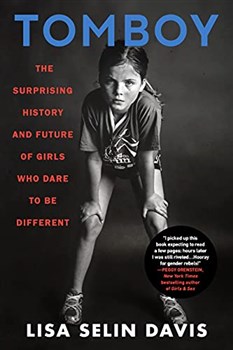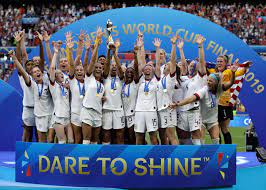What do you think of when you hear the word Tomboy?
 Does it bring back memories of roughhousing with your brothers, tinkering in the garage with your motorbike and preferring blue jeans to princess dresses? Or do you think of sports and how your confidence and character were shaped by playing on a team and having a coach who challenged you to pick yourself right up after setbacks and get back in the game?
Does it bring back memories of roughhousing with your brothers, tinkering in the garage with your motorbike and preferring blue jeans to princess dresses? Or do you think of sports and how your confidence and character were shaped by playing on a team and having a coach who challenged you to pick yourself right up after setbacks and get back in the game?
For me, a Baby Boomer who grew up in the 1950s and 60s, being a “tomboy” was all about freedom. Freedom to play tackle football with the neighborhood boys, ride horses and know I could hold my own in a fight with my three brothers.
I never had the chance to play organized sports. So I'm jealous when I see young girls in uniforms running on soccer fields and females pushing the edges of athleticism at the Olympics. But most of all, I am THRILLED when I see female athletes stepping forward as leaders to call out and challenge continued gender inequities in sports and fight for equal opportunity. Not just for themselves, but for all the girls to come.
 That’s exactly what Megan Rapinoe, Alex Morgan and their U.S. Women’s National Soccer teammates have been doing -- collectively -- for six years. Despite wining four World Cup titles, four Olympic gold medals and six straight years ranked FIFA’s No 1, they had to sue their own organization, U.S. Soccer, to fight for equal treatment.
That’s exactly what Megan Rapinoe, Alex Morgan and their U.S. Women’s National Soccer teammates have been doing -- collectively -- for six years. Despite wining four World Cup titles, four Olympic gold medals and six straight years ranked FIFA’s No 1, they had to sue their own organization, U.S. Soccer, to fight for equal treatment.
These world-class athletes refused to accept lower pay, inferior working conditions and lack of marketing support, as they dramatically outperformed their male peers in global soccer competition. They fought for equality, as a team, as fiercely as they fought for championships.
Their collective courage and tenacity paid off. U.S. Soccer just agreed to pay $25 million to settle the lawsuit. “Tacit admission,” according to the NY Times, “that compensation for the men’s and women’s teams has been unequal for years.”
That’s one gigantic step forward for women in sports.
While there's still a long way to go, let's relish this hard-fought victory and recognize its lasting legacy: the domino effect it helped to kick-start.The U.S. Olympic women’s ice hockey team, WNBA players and Canada’s women’s soccer team have all followed the U.S. soccer team’s example by fighting for equal pay in their own workplaces.
What a great way kick off Women’s History Month.
While we’re celebrating, let’s also reflect on the tremendous impact of athletes such as Billie Jean King who, nearly 50 years ago, formed the Women’s Tennis Association, threatened to boycott the U.S. Open and led the successful fight for equal prize money for women in tennis.
 And the important role modeling of Serena Williams, considered one of the greatest athletes of all time. Gymnast Simon Biles who changed the conversation about mental health and athleticism. Baseball trailblazers Kim Ng, the first female General Manager, now leading the Miami Marlins and Rachel Balkovec, just hired by the NY Yankees to manage their minor league Tampa Tarpons team. And 19-year old Belgian-British pilot Zara Rutherford who just set a world record as the youngest woman to fly SOLO around the world.
And the important role modeling of Serena Williams, considered one of the greatest athletes of all time. Gymnast Simon Biles who changed the conversation about mental health and athleticism. Baseball trailblazers Kim Ng, the first female General Manager, now leading the Miami Marlins and Rachel Balkovec, just hired by the NY Yankees to manage their minor league Tampa Tarpons team. And 19-year old Belgian-British pilot Zara Rutherford who just set a world record as the youngest woman to fly SOLO around the world.
I suspect that all of those women considered themselves “tomboys” as young girls. If you relish that part of yourself, as I still do, or perhaps the tomboy spirit in your daughter or granddaughter, you might like the new book, TOMBOY:The Surprising History and Future of Girls Who Dare to Be Different, and my interview with the author, Lisa Selin Davis, for my POWER UP WOMEN podcast.
The word "tomboy"has gone out of style, but the freedom and exhilaration of women discovering their own physical capabilities, as well as the inspiration we feel from watching other females prove in multiple new ways, "Yes We Can!" never will.